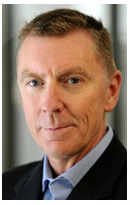The superintendent of the country’s second largest school system may step down from his post within months. Officials in Los Angeles Unified School District told the Los Angeles Times that Superintendent John Deasy will resign, but Deasy has yet to submit a formal letter of resignation or confirm that he is leaving.
The rumors come in the wake of LAUSD’s failed one-to-one iPad initiative, where within a month the devices were taken away from students. Deasy would have other, more enduring legacies in the district, though. Since taking the post in April 2011, he pushed through a new policy that ties teacher evaluations to student test scores and weakened the influence of seniority in determining layoffs.
Deasy has also become an enemy of the teachers union. In April, United Teachers Los Angeles (UTLA) polled their members, finding that 91 percent had “no confidence” in Deasy. On a scale of 1 to 5, he earned a 1.4. The UTLA’s website proclaimed Thursday: “It’s about time.”
“It is no secret that UTLA has had major concerns with John Deasy’s leadership,” said UTLA President Warren Fletcher in a statement. “Nonetheless the future of LAUSD is not about one man. The challenge going forward is to make sure students and schools get the resources they so badly need after five punishing years of recession. UTLA believes new leadership at LAUSD holds the potential to make that happen.”
Not everyone took the news so well. “John is a courageous advocate for kids and the best superintendent of America,” said Ben Austin, executive director of Parent Revolution, a California-based group that supports parent trigger laws nationally. “This is a gigantic loss for the kids of Los Angeles and the city of Los Angeles, and it could take a decade to put humpty dumpty back together again.”
The Hechinger Report will be updating the story throughout the day with more reactions for LA and thoughts from experts about what this means nationally.
Update: Some education experts see broader implications in Deasy’s potential departure. “There seems to be a growing trend away from data-driven superintendents who are focused on managerial solutions,” said Diane Ravitch a historian and former U.S. assistant secretary of education, “and a search instead for those who are more attuned to human dimension of education, both in terms of staff and students.”
Michael Petrilli, executive vice president of the Thomas B. Fordham Institute, predicts that a quick departure from Deasy will lead to more calls to rethink the governance of large school systems. “Many reformers are already skeptical that sustained improvement is possible when systems are overseen by elected boards – boards that are often beholden to the employees of the district,” he said. “Expect to hear renewed calls for mayoral control and other forms of governance reform.”
But Fredrick Hess, director of education policy studies at the American Enterprise Institute, was skeptical that the change in leadership would be felt outside the district. “I think he’s a smart, dynamic leader and that he’ll be missed.” He said. But “there’s so much noise and turbulence right now anyway, that I think his departure won’t have a lot in the way of national implications.” Hess noted that within the past year Chicago, the country’s third largest school district, and Clark County, the sixth largest, had superintendents step down without national ramifications.
Update: UTLA President Fletcher told The Hechinger Report that the news made sense to him after the “iPad debacle.”
“I was not expecting to hear it yesterday,” he said. “In the longer view, I was not wildly surprised.”
Fletcher also criticized how Deasy came to LAUSD originally, as a deputy superintendent. He says there was no attempt to seek outside input from teachers or community members during the search. “It was a deeply flawed process when he was hired,” Fletcher said, adding he hopes that next time the board will select someone who doesn’t make all decisions based on “a private sector, private business model.”
Mike Antonucci, director of the Education Intelligence Agency, a California-based group that monitors teachers unions, is doubtful that the union will like whoever Deasy’s eventual replacement is. “Maybe a Google search would turn up praise for some previous superintendent by UTLA, but I doubt it,” he said.
And there might not be many people even interested in the job, said Timothy Daly, president of TNTP, a nonprofit advocacy group. “Because of the highly political board and the size of the district, [LAUSD] has been close to ungovernable for a long time,” he said. “It will be very difficult for the board to attract capable candidates.”




